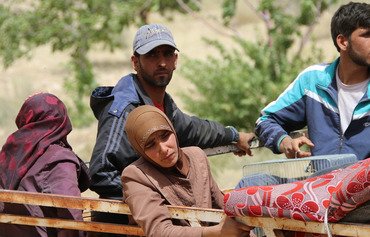Though the huge influx of Syrian refugees has strained Lebanon's infrastructure and services, it also has boosted the economy by augmenting the country's workforce and increasing its consumption of goods, economists say.
According to UN resident and humanitarian co-ordinator for Lebanon Phillippe Lazzarini, Lebanon has proved remarkably resilient while hosting 1.5 million refugees from Syria, the highest number of refugees per capita in the world.
But the situation has put pressure on the 5.9 million Lebanese, he said during a December 1st meeting to address the humanitarian situation.
"The refugees’ presence is putting pressure on the infrastructure, the environment and services in Lebanon," said Jad Shaaban, associate professor of economics at the American University of Beirut.
But their presence also is having a positive impact on the economy, he told Al-Mashareq, as there has been no increase in production costs due to the large pool of labour supplied by the refugee population.
Additionally, he said, the presence of Syrian refugees has increased the demand for goods, which has boosted the economic cycle in rural areas.
"The large number of shops opened by refugees may have had a limited negative impact on [rival] Lebanese establishments," Shabaan conceded, but they also have yielded a significant benefit for Lebanese real estate owners.
The rents Syrian refugees pay, and the goods they sell, have benefited both landlords and Lebanese consumers, he noted.
Increased consumption
"The presence of refugees has contributed to increasing consumption of foodstuffs, medicines, telephones, rents and in some cases energy," said Bank Audi chief economist and head of research Marwan Barakat.
This also includes school tuition, that some Syrian refugees pay to send their children to private schools, he told Al-Mashareq.
"This high consumption has helped the national economy avoid a recession despite all the economic pressures Lebanon is facing, as there is positive growth, albeit small," along with increased economic activity, he said.
"The amount of international funding spent on refugees and host communities in Lebanon through UNHCR and its partners was $1.68 billion last year," UNHCR assistant public information officer Lisa Abu Khaled told Al-Mashareq.
Lazzarini said the funding made it possible to provide water to 1.3 million people and help more than 850,000 buy food from shops in host communities.
These funds also helped more than 400,000 students enroll in school, he said.

![Syrian refugees line up to receive aid in the Zahle area of the Bekaa Valley. Refugees have strained Lebanon's infrastructure, but their presence also has boosted the economy, experts said. [Junaid Salman/Al-Mashareq]](/cnmi_am/images/2018/03/22/11896-Lebanon-Syrian-refugees-600_384.jpg)







First of all, let’s talk about the economy. If all Syrians go out of Lebanon en masse, you’ll find out what will happen. Firstly, there’ll be a full stoppage of the means of transportation. Secondly, there will be recession in all shops. Thirdly, debts will accumulate on the Lebanese who have been betting on rent, which they sometimes feed on. Fourthly, unemployment, as the UN has created 80,000 job opportunities, and these alone are enough to spark a revolution. Finally, I’d like to say that if the esteemed Lebanese state allows Syrians to come and go freely and renews residences, it will be in the best possible condition. Thanks.
Reply2 Comment(s)
If the Lebanese government facilitates the entry of Syrians to Lebanon, like the case before 2015, the Lebanese economy will be much bigger. This is because many come from Syria every day through smuggling routes, and smugglers take $200 per person. If those $200 are taken by the Lebanese government, it will be much better than those smugglers and thugs. It can also take $200 a year for renewing their papers, as only 1% of Syrians have legal residency and the rest came through smuggling.
Reply2 Comment(s)